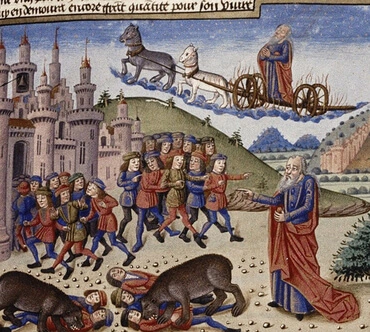7668. 'Go now, you young men, and serve Jehovah' means that those guided by truths that have been corroborated will be left alone, in order that they may worship the Lord. This is clear from the meaning of the command 'go' as the intimation that they will be left alone, as above in 7658; from the meaning of 'young men' as corroborated truths, dealt with below; and from the meaning of 'serving Jehovah' as worshipping the Lord, as above in 7654, 7664. The reason why 'young men' means those guided by truths that have been corroborated is that by sons, boys, young men, men, and old men' are meant aspects of intelligence and wisdom in their true order. Such aspects instead of those male persons are understood in heaven; for those in heaven possess spiritual ideas which are such that images from the purely natural order or the world cannot enter them without being instantly sloughed off and transformed into the kinds of images that are more in keeping with the wisdom of heaven and with angelic thought. This is why 'sons, boys, young men, men, and old men' cannot in the spiritual sense mean those male persons, only corresponding spiritual realities, which are aspects of intelligence and wisdom. The fact that these are meant is plainly evident from the internal sense of the places in the Word where they are mentioned.
[2] In the Word 'young men' is used to mean those who have intelligence, or - on the level of abstract ideas on which angels think - intelligence itself. And since intelligence is meant by them, so is firmly established truth since this belongs to intelligence. Also the expression which is used here in the original language to denote young men is derived from strength and power, which truth receives from good, and so which firmly established truth receives. And this name is therefore applied to the Lord in Zechariah,
O sword, rise up against My shepherd, and against the (young) man, My neighbour. Strike the shepherd, and the sheep are scattered. Zechariah 13:7.
These words were spoken in reference to the Lord, see Matthew 26:31. And also in Jeremiah,
How long do you wander around, O estranged daughter? Jehovah has created a new thing on the earth, a woman has surrounded a (young) man. Jeremiah 31:22.
[3] Another word for 'young men in the original language stands for intelligence, and so for the truth that belongs to it, in Amos,
I have sent the pestilence upon you in the way of Egypt, I have killed your young men with the sword, along with captured horses. 1
Amos 4:10.
'The way of Egypt' stands for perverted factual knowledge, young men who have been killed' for truths which have as a result been destroyed, and 'captured horses' for an understanding that has been led into error.
[4] In the same prophet,
They will wander from sea to sea, and from the north even to the east; they will run to and fro to seek the Word of Jehovah, and will not find it. On that day the beautiful virgins and the young men will faint from thirst. Amos 8:12-13.
'The beautiful virgins' stands for the affection for truth, 'the young men' for intelligence, and 'fainting from thirst' for being deprived of truth; and this is why it says 'they will run to and fro to seek the Word of Jehovah, and will not find it'. The fact that neither beautiful virgins, nor young men, nor fainting because of thirst are meant here is self-evident.
In Jeremiah,
Death has come up through our windows, it has entered our palaces, cutting off the young child from the street, young men from the lanes. Jeremiah 9:11.
In the same prophet,
How is the city of glory not forsaken, the city of My joy? Therefore her young men will fall in her streets. Jeremiah 49:25-26; 50:30.
In the same prophet,
Hear now, all peoples, see my sorrow; my virgins and my young men have gone into captivity. Lamentations 1:18.
In these places 'young men' stands for the truths that belong to intelligence.
Fotnoter:







